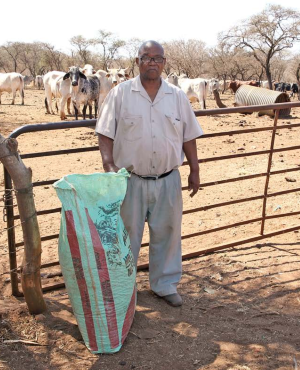
He just wants to leave a lasting legacy. Something his children, grandchildren and great grandchildren would be proud to call their own. This is why Limpopo farmer David Rakgase and his son, Mmofa, are taking the government to court. He wants to be able to buy the land he’s been leasing and farming on since before the dawn of democracy in South Africa.
David (77) farms cattle, sheep, goats, pigs and game in Northam, Limpopo. The widower and his four children have been working the 3 079-hectare Nooitgedacht farm in the Waterberg for 27 years and now he wants to own it, fair and square.
He’s filed papers with the North Gauteng High Court in Pretoria asking them to order the minister of rural development and land reform, Maite Nkoana- Mashabane, as well as the MEC for agriculture and rural development in Limpopo, Basikopo Makamu, to sell him the land.
We’re sitting on plastic chairs in the shade of some trees as the proud farmers tell us why they believe they should be able to buy the land.
“We’ve invested thousands of rands in this farm,” Mmofa (47) says. His father agrees. “Our roots are deep here. Our loved ones are buried here. My wife, Rosemary, and I sunk our pension money into the farm. And my children invested all their money in the farm buying Brahman and Nguni cattle, sheep, goats, pigs and game,” David says.
The Rakgases are believed to be the first to take the provincial and national departments to court to force them to follow through on a commitment to sell them their leased farm. Going to court was a last resort, they say.
“It’s hard for me not to fight for something that’s about my rights and dignity and the rights and dignity of my children and grandchildren. “If I don’t fight this I will have no legacy, nothing for them to cherish and be proud of in the years to come” David says.
The father and son say their livelihood and future is hanging in the balance because there’s no security for them without a title deed. They can’t pour any more money into the farm because they don’t know what will happen tomorrow.
“The government must do what is right and conclude the sale of the farm and give us the title deed,” Mmofa says. “We went to court as the final course of action because the government has not been fair to us.”
In 2002 the Rakgases qualified to buy the farm under the Land Redistribution for Agricultural Development programme. The programme, which was to help black people acquire land, has since been discontinued.
“The government came here to look at the farm and the Land Bank in Modimolle evaluated it at R1,2 million. We sent the application to the then-minister [Gugile Nkwinti] and have been doing follow-ups with all the ministers in the department. “It has been 16 years and the application has not yet been finalised,” David says.
When contacted for comment Phuti Mabelebele, spokesperson for the department of rural development and land reform, said they wouldn’t have details of the case available before going publication.
The Rakgases hope court action will make things move faster. As part of his court application they produced proof that David was offered an opportunity to buy the land from the government for R1,2 million in 2002. The government would give him R400 000 as a grant and he would pay the rest. He agreed and has been waiting for the wheels to turn. “We pay a monthly rental of R3 410 to the department of rural development and land reform,” Mmofa says. “No one wants to take responsibility for the years we’ve been waiting for government’s approval and no one wants to give us a straight answer.
“We tried to push and push and at last we felt the only solution was going to the high court. We want the high court to tell them to give us the title deed,” the frustrated farmer says. The state is opposing the case – they filed a notice to oppose – but the ministry hasn’t filed their full papers yet. It’s clear David and Mmofa feel connected to this land as they give us a tour. There was just a farmhouse on the property when they first leased it in 1991 and they’ve since made improvements. They’ve built storage rooms and roads, have sunk boreholes, installed an irrigation system and put up new fencing to protect the game on the farm. Their farm has become a training ground for up-and-coming young black farmers. It’s also a source of employment – David employed 30 farmworkers at one point but has had to let some go due to the uncertainty. Farming hasn’t always been easy and they’ve been victims of land invasion.
In 2016 a portion of their farm was invaded by squatters who built shacks. “I still have to pay the full monthly rent because contractually we are liable. I, the person who leased the land, must intervene and try to make the invaders pay. And you know they will never do that,” David says, shaking his head. About 1 700 hectares of land was invaded and David approached the high court in Polokwane in April this year to have the squatters evicted from his land. “We are still waiting,” he says.
Farming is a family business for the Rakgases. David’s grandfather and father were cattle farmers who lived about 12km from Nooitgedacht. “We are a family of farmers. “Even when I was a reverend in the Dutch Reformed Church I knew I was going to be a farmer after retirement.” And David’s children are following in his footsteps.
His son Kgaogelo (37) and daughter Tshwaragano (34) have higher diplomas in agriculture from PH Moeketsi Agricultural School in Taung, North West. Mmofa has a BSc degree in agriculture and animal production from the University of the North West, a degree in animal production and another in pastoral farming from the University of Pretoria, as well as a master’s degree in risk management from the University of the Free State. He’s currently doing a PhD in animal production at the University of Limpopo. David’s other son, Mathaithai (42), started working on the farm as a manager from an early age.
David’s wife, Rosemary, was a school principal and died in 2005. She and two of her grandchildren, Andreas and Mary, are buried near the farmhouse. This is home, the family tell us. And farming is their passion. They have 500 cattle, 30 pigs, 80 sheep and 130 goats so far. They want to be part of providing “development, sustainability and food security”, Mmofa says. Their case proves the land debate is crucial in South Africa, they say. And it has to be handled properly, or it will fail. Having a title deed provides a level of dignity and security, and that’s all David wants for his family. Red tape is what’s standing between him and the dignity of land ownership, he says. “I buried my wife and grandchildren here,” he tells DRUM.
“Sixteen years waiting is a very long time by any standard of reasoning. This farm is my home.”


















